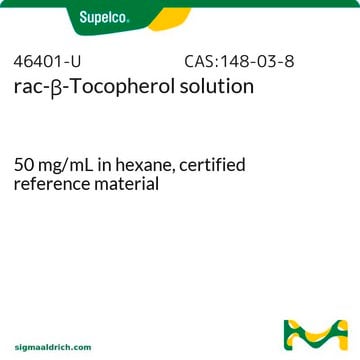T3251
(±)-α-Tocopherol
synthetic, ≥96% (HPLC)
Synonym(s):
DL-all-rac-α-Tocopherol, Vitamin E
About This Item
Recommended Products
biological source
synthetic
Assay
≥96% (HPLC)
form
liquid
technique(s)
HPLC: suitable
color
faint brown to brown
yellow to very dark yellow
solubility
H2O: insoluble
acetone: miscible
chloroform: miscible
ethanol: miscible
vegetable oils: miscible
density
0.950 g/mL at 20 °C (lit.)
storage temp.
2-8°C
SMILES string
CC(C)CCCC(C)CCCC(C)CCCC1(C)CCc2c(C)c(O)c(C)c(C)c2O1
InChI
1S/C29H50O2/c1-20(2)12-9-13-21(3)14-10-15-22(4)16-11-18-29(8)19-17-26-25(7)27(30)23(5)24(6)28(26)31-29/h20-22,30H,9-19H2,1-8H3
InChI key
GVJHHUAWPYXKBD-UHFFFAOYSA-N
Looking for similar products? Visit Product Comparison Guide
Application
Biochem/physiol Actions
Preparation Note
Signal Word
Warning
Hazard Statements
Precautionary Statements
Hazard Classifications
Skin Sens. 1
Storage Class Code
10 - Combustible liquids
WGK
WGK 1
Personal Protective Equipment
Certificates of Analysis (COA)
Search for Certificates of Analysis (COA) by entering the products Lot/Batch Number. Lot and Batch Numbers can be found on a product’s label following the words ‘Lot’ or ‘Batch’.
Already Own This Product?
Find documentation for the products that you have recently purchased in the Document Library.
Customers Also Viewed
Articles
DISCOVER Bioactive Small Molecules for Nitric Oxide & Cell Stress Research
Antioxidants protect biological systems from oxidative damage produced by oxygen-containing free radicals and from redoxactive transition metal ions such as iron, copper, and cadmium.
Our team of scientists has experience in all areas of research including Life Science, Material Science, Chemical Synthesis, Chromatography, Analytical and many others.
Contact Technical Service








